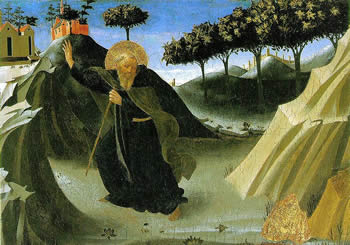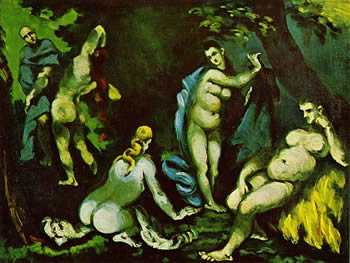Collision Course:
The Kingdom of God and the Status Quo of the World
For Sunday June 10, 2012
Lectionary Readings (Revised Common Lectionary, Year B)
1 Samuel 8:4–20, 11:14–15 or Genesis 3:8–15
Psalm 138 or 130
2 Corinthians 4:13–5:1
Mark 3:20–35
A few months ago I watched an interview on the PBS News Hour with ninety-four year-old Stephane Hessel. In 2010 Hessel published an essay in France called Time for Outrage: Indignez-vous! In book form it measures just four by six inches. You can read the entire essay over one cup of coffee. The original print run was only 6,000 copies. As I write today, Time for Outrage has sold 3.5 million copies and been translated into a dozen languages.
 |
St. Anthony tempted by gold, Fra Angelico, c. 1436. |
Hessel is a Jewish concentration camp survivor, a proud member of the French Resistance against the Nazis, a UN diplomat instrumental in writing the Universal Declaration of Human Rights (1948), and a fervent human rights advocate. As he puts it, "I've always sided with the dissidents and against every form of dehumanization."
His jeremiad is a plea to recover a sense of outrage in our own day. Why? Because "the wealthy have installed their slaves in the highest spheres of the state. The banks are privately owned. They are concerned only with profits. They have no interest in the common good. The gap between rich and poor is the widest it's ever been; the pursuit of riches and the spirit of competition are encouraged and celebrated."
Hessel challenges his readers to move from indifference to indignation. "You must engage — your humanity demands it." His protest of the status quo of money, politics, and power reminds me of one of his French contemporaries and fellow members of the Resistance, the sociologist and Christian Jacques Ellul of Bordeaux. For Ellul, "to exist is to resist" (Exister, c’est résister).
The readings this week describe two alternatives: mimicking the status quo of the world or living on the lunatic fringe in the kingdom of God. One story is about politics, the other about family life.
1 Samuel 8 describes the emergence of Israel’s centralized power. The people demanded the status quo: "We want a king like the other nations.” Samuel objected to their desire to mimic the pagan nations, he went to God in prayer, but was finally rebuffed by the people: "No! We want a king over us. Then we will be like all the other nations." He ceded to their request, but warned them of the harsh consequences to follow — the government would conscript their children for wars, make them domestic slaves, confiscate their land, and levy exorbitant taxes.
The newly anointed Saul did all this and more. He was a war president: "All the days of Saul there was bitter war with the Philistines." He was also a war profiteer who after defeating the Amalekites took for himself "the best of the sheep and cattle, the fat calves and lambs — everything that was good," all under the pretext of religious piety (1 Samuel 14:52, 15:9). Saul also "set up a monument in his own honor" (15:12). Does this ancient story of the political status quo not sound tragically modern?
 |
Paul Cezanne, The Temptation of Anthony, c. 1870. |
Saul's successors were even worse. The political panorama of 1–2 Kings includes the reigns of forty kings and one queen (Athaliah in 2 Kings 11) in the 400 hundred years from the death of David to Israel's exile to Babylon in 586 BC. Only two kings received unqualified approval by the narrator (Hezekiah in 2 Kings 18:3 and Josiah in 22:2). With monotonous regularity, over thirty times he renders the ominous judgment that a king "did evil in the eyes of the Lord." Instead of the glorification or celebration of political power, his history of politics is uniformly pessimistic. The status quo held firm and people paid the price.
In the gospel this week Jesus subverts the status quo. His own family thought he had gone mad: "He's out of his mind," they said. Judged by the standard of the status quo, they were right.
We're totally ignorant about the first thirty years of Jesus's life, except for one revealing snippet by Luke, who tells the story of the twelve-year-old Jesus in the Jerusalem temple. On the return trip home, his parents discovered that Jesus was missing from their caravan of family and friends. After a second day to return to Jerusalem to look for him, on the third day they found Jesus in the temple, "sitting among the teachers, listening to them and asking them questions." When Mary scolded him it became apparent that Jesus was not accidentally lost, but that he had deliberately stayed behind: "Didn't you know that I had to be in my Father's house?"
Even as a child there was a palpable tension between Jesus's filial identity with God the Father and obedience to his earthly parents. Eventually his obedience to God provoked a radical rupture with his family. In his late twenties Jesus deserted his family and joined the movement of his eccentric cousin John the Baptizer. John was a prophet of radical dissent, so much so that his detractors said that he had a demon (Luke 7:33).
Whereas John's father had been part of the religious establishment as a priest in the Jerusalem temple, John fled the comforts and corruptions of the city for the loneliness of the desert. There he dressed in animal skins, ate insects and wild honey, preached, and baptized. Living on the margins of society, both literally and figuratively, he preached "a baptism of repentance for the forgiveness of sins."
John challenged the religious and political status quo with his anti-establishment message. By joining John's fringe movement, Jesus did too. After his radical rupture with his family by identifying with the desert troublemaker, to the point of submitting to his baptism, Jesus's family tried to apprehend him. The village of Nazareth tried to kill him as a deranged crackpot (cf. Mark 3:21, Luke 4:29, John 7:5). When his mother and brothers found him, he rebuffed them and redefined family. "Who are my mother and my brothers?" He gestured to those who had gathered around him: "Whoever does God's will is my brother and sister and mother."
And so just as with John, they said that Jesus was demon-possessed.
 |
Hieronymous Bosch, The Temptation of Anthony, c. 1450. |
The accusations of madness and demon-possession remind me of another desert dweller, St. Anthony the Great (251–356). Anthony was an uneducated Copt born into a Christian family of peasant farmers. When he was eighteen his parents died, leaving him to care for his younger sister. Six months later he was reflecting on Acts 4:35 and how the early believers sold their possessions and gave the proceeds to the apostles. When he got to church that same day, the gospel reading was Matthew 19:21, "If you would be perfect, go, sell what you possess and give to the poor, and you will have treasure in heaven."
Anthony put his sister into the care of a convent of nuns, sold his possessions, and attached himself to an ascetic on the fringe of his village. Later he went deep into the desert alone. People followed him there for advice, and for a while he offered counsel, but later still he returned to his life of solitary spirituality. We can imagine that people thought he was mad.
"Abba Anthony said, 'A time is coming when men will go mad, and when they see someone who is not mad, they will attack him saying, "You are mad, you are not like us."'"
We have a choice: to live on the lunatic fringe in the kingdom of God, where even the most basic values of family and politics are radically redefined, or to support the status quo with its predictably oppressive consequences.
For further reflection
* Romans 12:2, "Do not be conformed to the pattern of this world, but be transformed by the renewing of your mind."
* Wendell Berry (born 1934)
Manifesto: The Mad Farmer Liberation Front
Love the quick profit, the annual raise,
vacation with pay. Want more
of everything ready-made. Be afraid
to know your neighbors and to die.
And you will have a window in your head.
Not even your future will be a mystery
any more. Your mind will be punched in a card
and shut away in a little drawer.
When they want you to buy something
they will call you. When they want you
to die for profit they will let you know.
So, friends, every day do something
that won't compute. Love the Lord.
Love the world. Work for nothing.
Take all that you have and be poor.
Love someone who does not deserve it.
Denounce the government and embrace
the flag. Hope to live in that free
republic for which it stands.
Give your approval to all you cannot
understand. Praise ignorance, for what man
has not encountered he has not destroyed.
Ask the questions that have no answers.
Invest in the millenium. Plant sequoias.
Say that your main crop is the forest
that you did not plant,
that you will not live to harvest.
Say that the leaves are harvested
when they have rotted into the mold.
Call that profit. Prophesy such returns.
Put your faith in the two inches of humus
that will build under the trees
every thousand years.
Listen to carrion — put your ear
close, and hear the faint chattering
of the songs that are to come.
Expect the end of the world. Laugh.
Laughter is immeasurable. Be joyful
though you have considered all the facts.
So long as women do not go cheap
for power, please women more than men.
Ask yourself: Will this satisfy
a woman satisfied to bear a child?
Will this disturb the sleep
of a woman near to giving birth?
Go with your love to the fields.
Lie down in the shade. Rest your head
in her lap. Swear allegiance
to what is nighest your thoughts.
As soon as the generals and the politicos
can predict the motions of your mind,
lose it. Leave it as a sign
to mark the false trail, the way
you didn't go.
Be like the fox
who makes more tracks than necessary,
some in the wrong direction.
Practice resurrection.
Image credits: (1) Wikipedia.org; (2) Wikipedia.org; and (3) Wikipedia.org.





